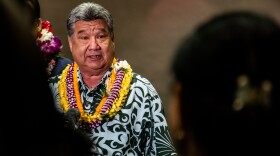Should Hawaiʻi ban octopus farming? The practice is already almost nonexistent around the world, and a facility in the Canary Islands is one of the few with actual plans to raise them for food.
Still, a pair of companion bills going through the state Legislature would prohibit octopus aquaculture.
House Bill 365 and Senate Bill 1159 made it out of their first committee hearings this week. They argue that raising the animals for consumption could lead to environmental and ecological threats.
But they also argue that it’s unethical to farm animals with what the measures say are “advanced cognitive abilities.”
Lindsay Vierheilig, legislative affairs manager with the Animal Legal Defense Fund, said, “As anyone who has spent any time in the water with them knows, octopuses are extremely intelligent, complex animals and are simply not compatible with farming environments.”
Others worry about the runoff and spread of diseases from octopus farming. There’s also a high risk of them escaping and disrupting the local food web.
The state Department of Land and Natural Resources, which neither supported nor opposed the measures, noted that octopuses are an increasingly popular food item, have a short lifecycle, and produce a lot of offspring.
But there isn’t much information about octopus aquaculture, and the common octopus is the only species that has even been cultured from eggs to adulthood.
That makes it even more likely that it will take off in Hawaiʻi soon.
“The day octopus and the night octopus are the most commonly eaten octopus species in Hawaiʻi... Thus far, there have been no successful attempts at closing the life cycle in captivity for either species. The possibility of octopus aquaculture of these species is not presently feasible,” the DLNR said in written comments.
The only octopus farm in the U.S. was the Kanaloa Octopus Farm on Hawaiʻi Island. But it closed in 2023 after accusations that it was operating as a petting zoo and had illegally acquired its animals.






